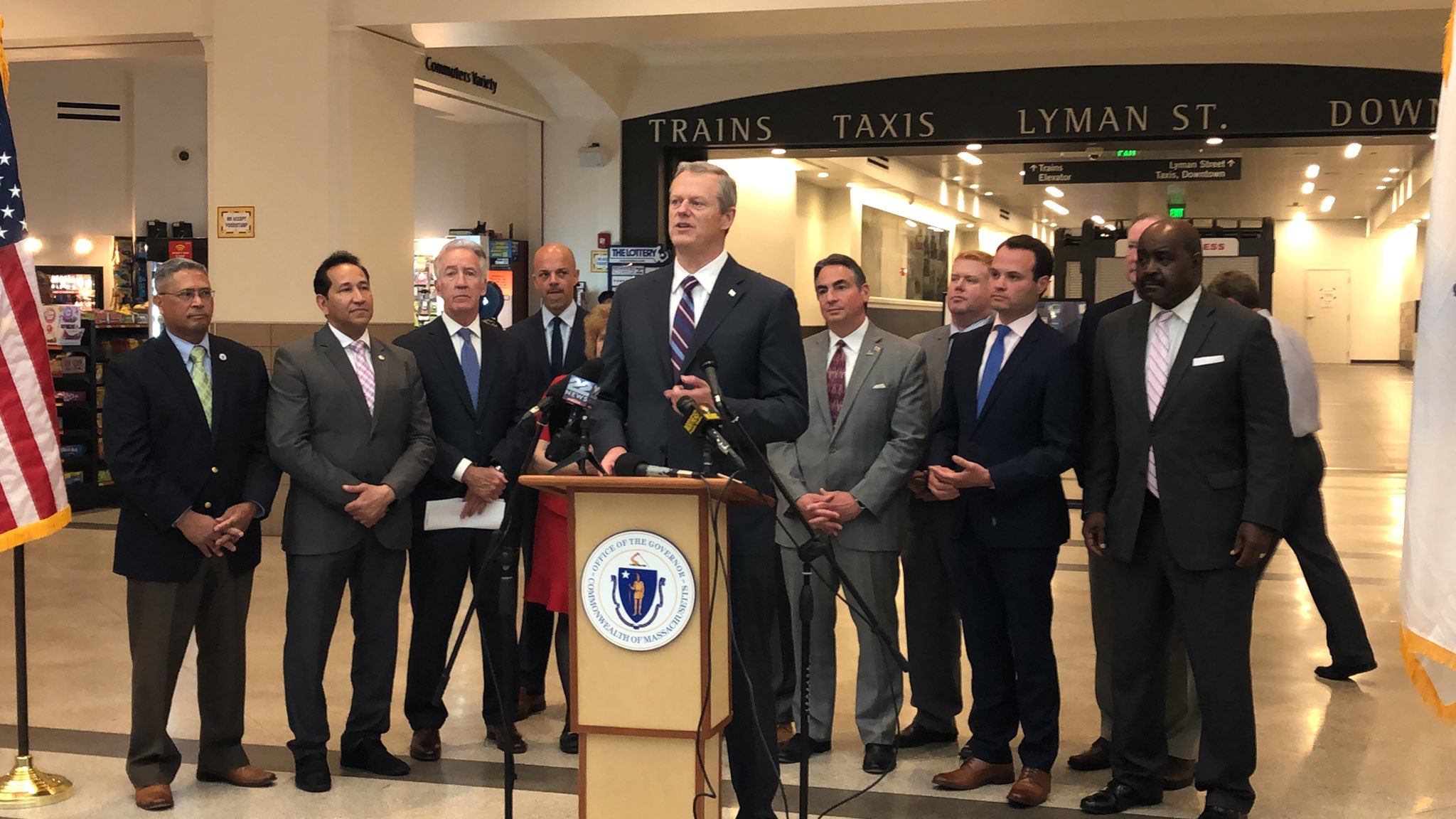Briefings: Baker Climbs aboard Rail Study…at Yorktown…

Lord Charles Cornbaker concedes defeat. (created via WMassP&I, Architect of the Capitol & Google image search)
It may not have been unconditional, but it was surrender.
On Tuesday afternoon, surrounded by Springfield area legislators and US Rep Richard Neal, Governor Charlie Baker announced the East-West rail study will go out to bid Wednesday. To Baker’s left stood a seemingly triumphant Senator Eric Lesser, who has championed the issue for four years.
Baker’s announcement was news only in that the bid was going out. The Massachusetts Department of Transportation had already put the study in the state rail plan. Yet the study, the first of two rail concession Baker made in the 413, reflects how potent Western Mass rail politics have become.
“Today we want to talk about, first of all, announcing a request for proposals for a consultant team to study the east-west passenger rail service,” Baker said. He noted, understatedly, the issue had been “something that has been talked about quite a bit.”
Baker also announced an agreement with Amtrak for a two-year pilot service on the “Knowledge Corridor” to Greenfield. Starting next year, two trains will complement the once-daily Vermonter that stops in Greenfield, Holyoke and Northampton. The new trains, Valley rail evangelists hope, will appeal to commuters and day trippers more than the Vermonter‘s midday interstate run.

Baker throws himself on the mercy of passing commuters. Well not really. (via Twitter/@EricLesser)
Baker noted the start of Hartford Line service this Saturday. However, that project is principally an endeavor of the State of Connecticut and Amtrak. Although the national railroad will not run the service, it owns the line through the Land of Steady Habits to Springfield.
“This progress is thanks to the thousands of people in Western Mass who didn’t give up, who didn’t back down, and who made clear to those on Beacon Hill that a study of East-West Rail is a priority for our region,” Lesser said in a statement, taking a(nother) victory lap.
Baker’s resistance to the study and, until recently, slow-walking Knowledge Corridor expansion has baffled local observers and advocates. The only possible explanation was avoiding any new expenses, an approach derided as pennywise and pound foolish.
However, the Knowledge Corridor had the advantage of state ownership and recent upgrades.
MassDOT and Amtrak must still work out details like how trains will pull into Springfield. Presumably they will operate bidirectionally and avoid a 10-minute backup move the Vermonter performs to enter Union Station. As that movement would cross CSX’s tracks, the railroad must greenlight it. Baker also mentioned unspecified infrastructure upgrades.
For East-West rail to expand beyond the once-daily Chicago-bound Lake Short Limited, the commonwealth would need to either buy out CSX or accommodate the freight goliath.

Baker’s budget pruning killed the rail study in 2016. (created with WMassP&I 20th Century Fox images)
Baker used nearly every tool to avoid that conversation. He vetoed Lesser’s study in 2016 and has poo-pooed it continuously including at a Republican editorial board meeting this year. Tuesday, he called it a “multimillion dollar” study, a figure Lesser and rail advocates have disputed.
For a time, Baker seemed to be waiting Lesser out. The legislature, whatever its reasons, only advanced the study to Baker’s desk once. That same year Baker vetoed the study, he campaigned vigorously to oust Lesser. Voters reelected Lesser by 12 points.
Lesser may not have forced the study into law, but he did leverage public opinion and bring voters to the State House. Rail advocates feared Baker might exploit political and rhetorical fault lines surrounding East-West rail. That never happened, though.
Instead, Baker caved to Lesser, even making a show of it at Union Station. The study will even look at service to Palmer and through to Pittsfield.
Perhaps for Baker, it was easier to dispense with the issue than let Jay Gonzalez, the Lesser-endorsed Democratic gubernatorial contender, campaign on the issue. (Spoiler: Gonzalez still will).
That does not mean the battle is over. One fear is MassDOT could look at prohibitively expensive Shinkansen-type service to the exclusion of simpler upgrades like (re)double-tracking CSX’s line. Lesser and his allies have repeatedly noted he can still press his standalone rail study bill should the administration try to screw him over.
Nearly 54 months after launching his own political career, Lesser’s study is leaving the station. Yet, miles of track lie between here and regular service to Boston. Moreover, Lesser cannot assume Baker will sue for peace at the next station, too.